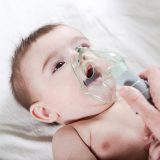Influenza infection in infants – what parents must know

Influenza (flu) infection in infants can lead to serious illness, so it is essential for parents to understand the risks, recognize symptoms early, and know prevention and treatment measures.
Why Infants Are at Risk
-
Infants have a developing immune system, making them more vulnerable to severe illness from the flu compared to older children and adults.
-
Babies under 6 months cannot receive the flu vaccine themselves, but those 6 months and older should get vaccinated annually.
-
Adults and older children in close contact with infants should also be vaccinated to help protect the baby (cocooning).
How Influenza Spreads
-
The virus spreads through droplets in the air when an infected person coughs, sneezes, or talks.
-
Contact with contaminated surfaces, toys, or hands is another route; infants often touch their faces or put objects in their mouths.
Signs and Symptoms
-
Fever (may be high or unexplained in newborns)
-
Cough, runny nose, or sore throat
-
Unusual tiredness, irritability, or refusing to feed
-
Body aches, chills, or headache
-
Vomiting and diarrhea (more common in young children)
-
Severe signs: difficulty breathing, dehydration (few wet diapers), persistent high fever, or lethargy
When to Seek Medical Attention
-
Immediate medical attention is needed for breathing problems, bluish lips, poor feeding, dehydration, persistent vomiting, or seizures.
-
Consult a healthcare provider if symptoms worsen, don’t improve after a few days, or if the child appears very unwell.
Prevention Tips
-
Annual flu vaccination for children 6 months and older is crucial.
-
Vaccinate household members and caregivers if the infant is under 6 months.
-
Practice good hand hygiene, respiratory etiquette (cover coughs and sneezes), and disinfect surfaces regularly.
-
Avoid contact with people who are sick.
-
Keep infants away from crowded places during peak flu season.
Treatment and Home Care
-
Antiviral medications (e.g., oseltamivir) may be prescribed for infants at high risk or with confirmed influenza, especially if started within 48 hours of symptom onset.
-
Manage fever with doctor-approved medications. Do not give aspirin to infants due to the risk of Reye’s syndrome.
-
Keep the infant hydrated, allow rest, and monitor for worsening symptoms.
Other Key Points for Parents
-
Breastfeeding is encouraged; if the mother has flu symptoms, milk can be expressed and fed by a healthy caregiver.
-
The flu shot does not cause the flu. Some infants may have mild side effects like low-grade fever after vaccination.
-
Infants should stay home and away from daycare or gatherings until fever-free for at least 24 hours without fever-reducing medications.
Parents play a vital role in protecting infants from influenza by maintaining vaccination schedules, enforcing hygiene, and seeking prompt care when needed.


